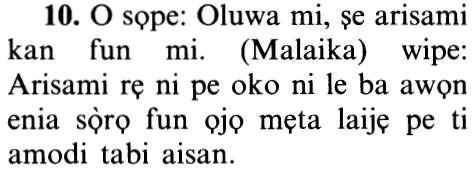19vs10
Select any filter and click on Go! to see results
قَالَ رَبِّ اجْعَل لِّي آيَةً قَالَ آيَتُكَ أَلَّا تُكَلِّمَ النَّاسَ ثَلَاثَ لَيَالٍ سَوِيّاً
Qala rabbi ijAAal lee ayatan qala ayatuka alla tukallima alnnasa thalatha layalin sawiyyan
Index Terms
Click to play
Yoruba Translation

Hausa Translation
Ya ce: "Yã Ubangijina! Ka sanya mini alãma." Ya ce: "Alamarka ita ce ka kãsa yi wa mutãne magana a darũruwa uku daidai."
Asbabu n-Nuzuul (Occasions of Revelation)
The Sign of the Pregnancy
Allah, the Exalted, informed about Zakariyya that he said,
قَالَ رَبِّ اجْعَل لِّي آيَةً ...
He (Zakariyya) said: "My Lord! Appoint for me a sign.''
"Give me a sign and a proof of the existence of that which You have promised me, so that my soul will be at rest and my heart will be at ease with Your promise.''
Similarly Ibrahim said,
رَبِّ أَرِنِى كَيْفَ تُحْىِ الْمَوْتَى
قَالَ أَوَلَمْ تُؤْمِن
قَالَ بَلَى وَلَـكِن لِّيَطْمَئِنَّ قَلْبِى
My Lord! Show me how You give life to the dead.
He (Allah) said: "Do you not believe''
He said: "Yes (I believe), but to put my heart at ease.'' (2:260)
Then Allah says,
... قَالَ آيَتُكَ ...
He said: "Your sign is...''
meaning, "Your sign will be...''
... أَلَّا تُكَلِّمَ النَّاسَ ثَلَاثَ لَيَالٍ سَوِيًّا ﴿١٠﴾
that you shall not speak unto mankind for three nights, though having no bodily defect.
Meaning, `your tongue will be prevented from speaking for three nights while you are healthy and fit, without any sickness or illness.'
Ibn Abbas, Mujahid, Ikrimah, Wahb, As-Suddi, Qatadah and others said,
"His tongue was arrested without any sickness or illness.''
Abdur-Rahman bin Zayd bin Aslam said,
"He used to recite and glorify Allah, but he was not able to speak to his people except by gestures.''
Al-`Awfi reported that Ibn Abbas said, ثَلَاثَ لَيَالٍ سَوِيًّا (three nights, though having no bodily defect),
"The nights were consecutive.''
However, the first statement that is reported from him and the majority is more correct.
This Ayah is similar to what Allah, the Exalted, said in Surah Al Imran,
قَالَ رَبِّ اجْعَل لِّيَ آيَةً
قَالَ آيَتُكَ أَلاَّ تُكَلِّمَ النَّاسَ ثَلاَثَةَ أَيَّامٍ إِلاَّ رَمْزًا وَاذْكُر رَّبَّكَ كَثِيرًا وَسَبِّحْ بِالْعَشِيِّ وَالإِبْكَارِ
He said: "O my Lord! Make a sign for me.''
(Allah) said "Your sign is that you shall not speak to mankind for three days except with signals. And remember your Lord much, and glorify (Him) in the afternoon and in the morning. (3:41)
This is a proof that he did not speak to his people for these three nights and their days as well.
إِلاَّ رَمْزًا (except with signals),
Meaning, with bodily gestures, this is why Allah says in this noble Ayah,
يقول تعالى مخبرا عن زكريا عليه السلام أنه " قال رب اجعل لي آية " أي علامة ودليلا على وجود ما وعدتني لتستقر نفسي ويطمئن قلبي بما وعدتني كما قال إبراهيم عليه السلام " رب أرني كيف تحيي الموتى قال أولم تؤمن قال بلى ولكن ليطمئن قلبي " " قال آيتك " أي علامتك " ألا تكلم الناس ثلاث ليال سويا " أي أن تحبس لسانك عن الكلام ثلاث ليال وأنت صحيح سوي من غير مرض ولا علة . قال ابن عباس ومجاهد وعكرمة ووهب والسدي وقتادة وغير واحد اعتقل لسانه من غير مرض ولا علة قال ابن زيد بن أسلم كان يقرأ ويسبح ولا يستطيع أن يكلم قومه إلا إشارة وقال العوفي عن ابن عباس " ثلاث ليال سويا " أي متتابعات والقول الأول عنه وعن الجمهور أصح كما قال تعالى في آل عمران " قال رب اجعل لي آية قال آيتك ألا تكلم الناس ثلاثة أيام إلا رمزا واذكر ربك كثيرا وسبح بالعشي والإبكار " وقال مالك عن زيد بن أسلم " ثلاث ليال سويا " من غير خرس وهذا دليل على أنه لم يكن يكلم الناس في هذه الليالي الثلاث وأيامها " إلا رمزا " أي إشارة .
"قال رب اجعل لي آية" أي علامة على حمل امرأتي "قال آيتك" عليه "ألا تكلم الناس" أي تمتنع من كلامهم بخلاف ذكر الله "ثلاث ليال" أي بأيامها كما في آل عمران ثلاثة أيام "سويا" حال من فاعل تكلم أي بلا علة
طلب آية على حملها بعد بشارة الملائكة إياه , وبعد " وقد خلقتك من قبل ولم تك شيئا " زيادة طمأنينة ; أي تمم النعمة بأن تجعل لي آية , وتكون تلك الآية زيادة نعمة وكرامة . وقيل : طلب آية تدله على أن البشرى منه بيحيى لا من الشيطان ; لأن إبليس أوهمه ذلك . قاله الضحاك وهو معنى قول السدي ; وهذا فيه نظر لإخبار الله تعالى بأن الملائكة نادته حسب ما تقدم في " آل عمران " .
I'raab - grammatical analysis of the Qur'an
«قالَ» ماض فاعله مستتر والجملة مستأنفة «رَبِّ» منادى منصوب مضاف إلى ياء المتكلم المحذوفة وجملة النداء وما بعدها مقول القول «اجْعَلْ» فعل دعاء والفاعل مستتر «لِي» متعلقان باجعل «آيَةً» مفعول به «قالَ» ماض فاعله مستتر والجملة مستأنفة «آيَتُكَ» مبتدأ والكاف مضاف إليه والجملة مقول القول «أَلَّا»
أن حرف ناصب ولا نافية لا عمل لها «تُكَلِّمَ» مضارع منصوب بأن والفاعل مستتر «النَّاسَ» مفعول به والمصدر المؤول خبر المبتدأ «ثَلاثَ» ظرف زمان متعلق بتكلم «لَيالٍ» مضاف إليه «سَوِيًّا» صفة لليال
